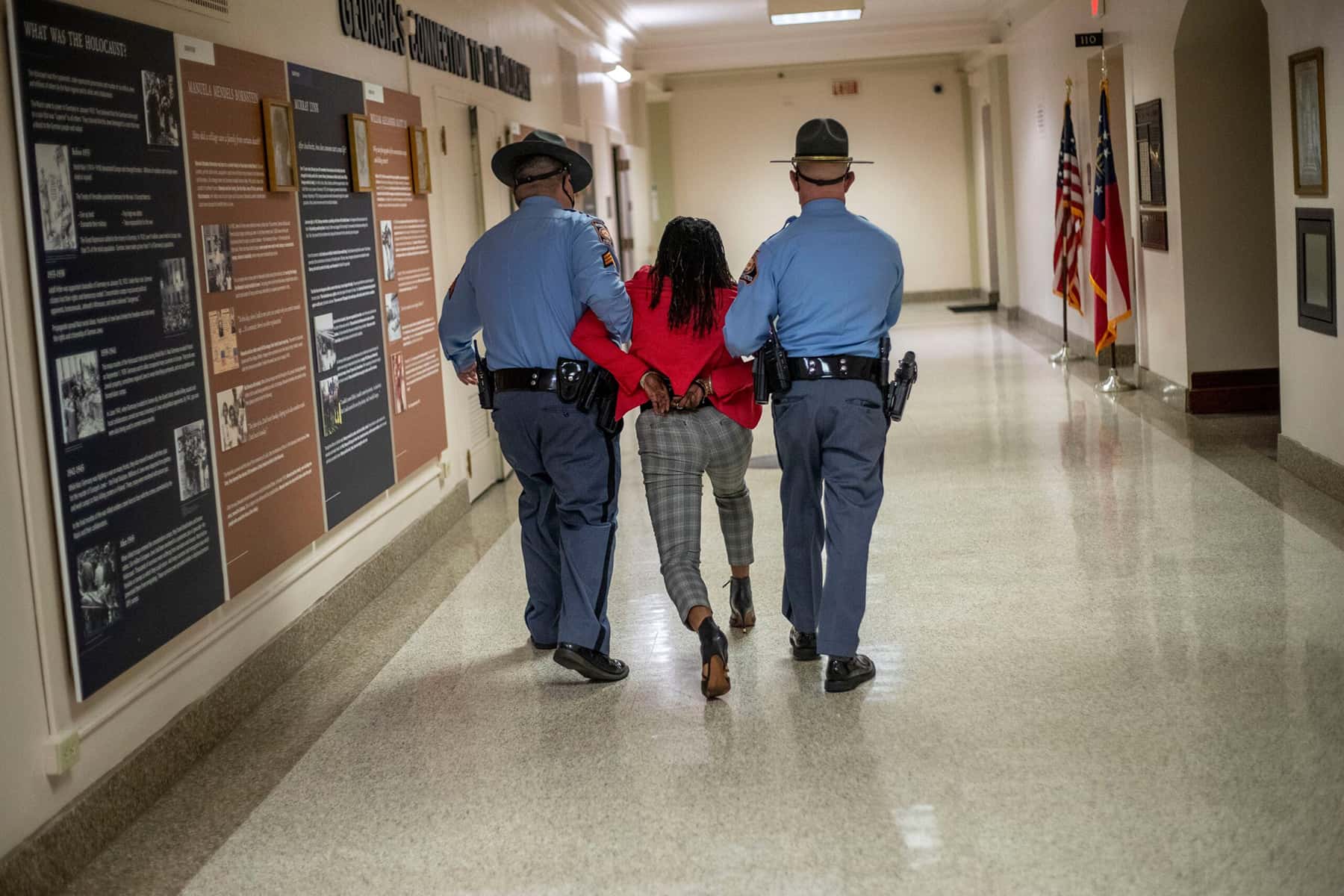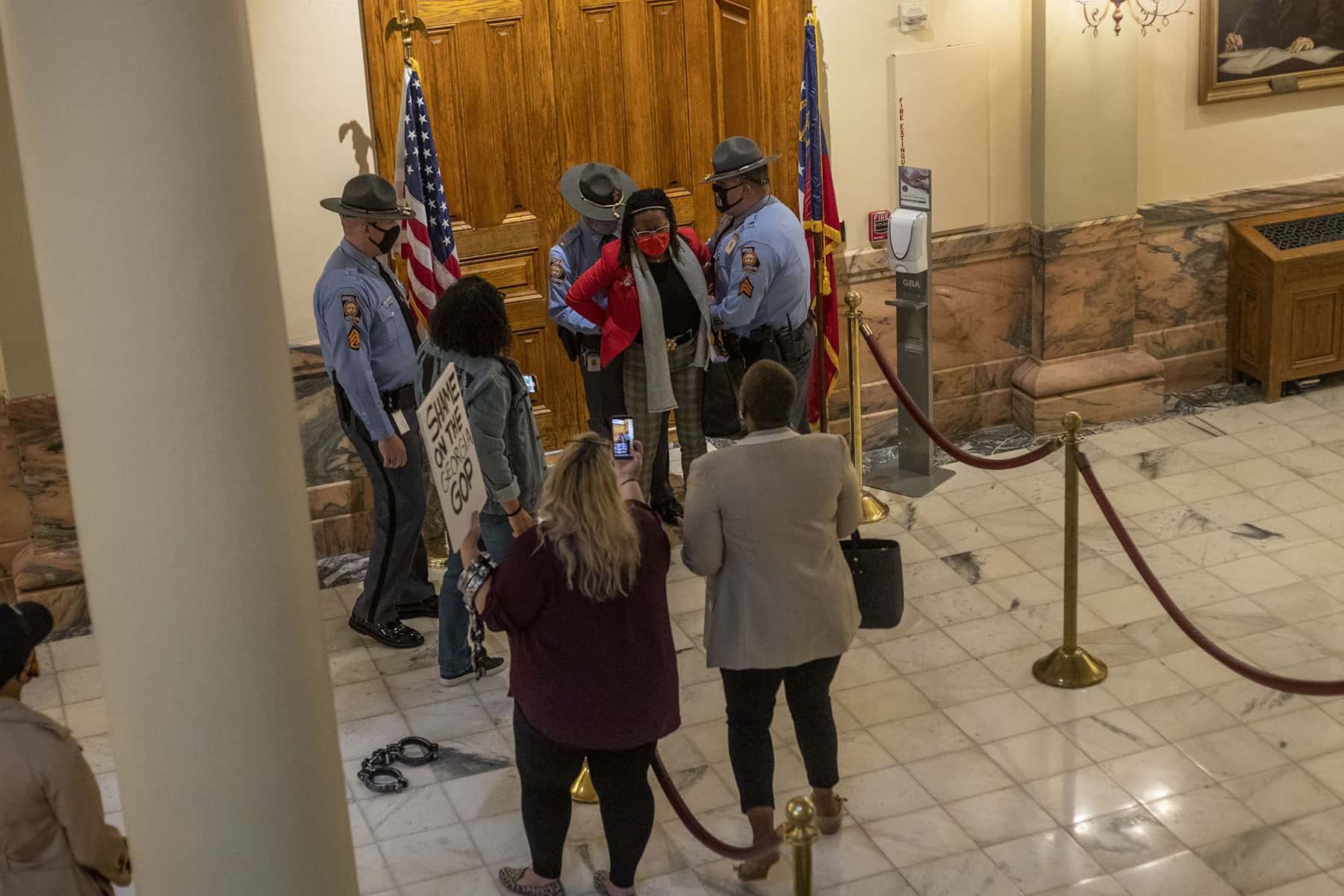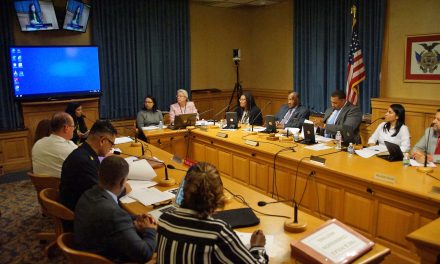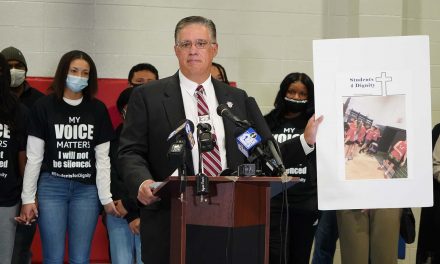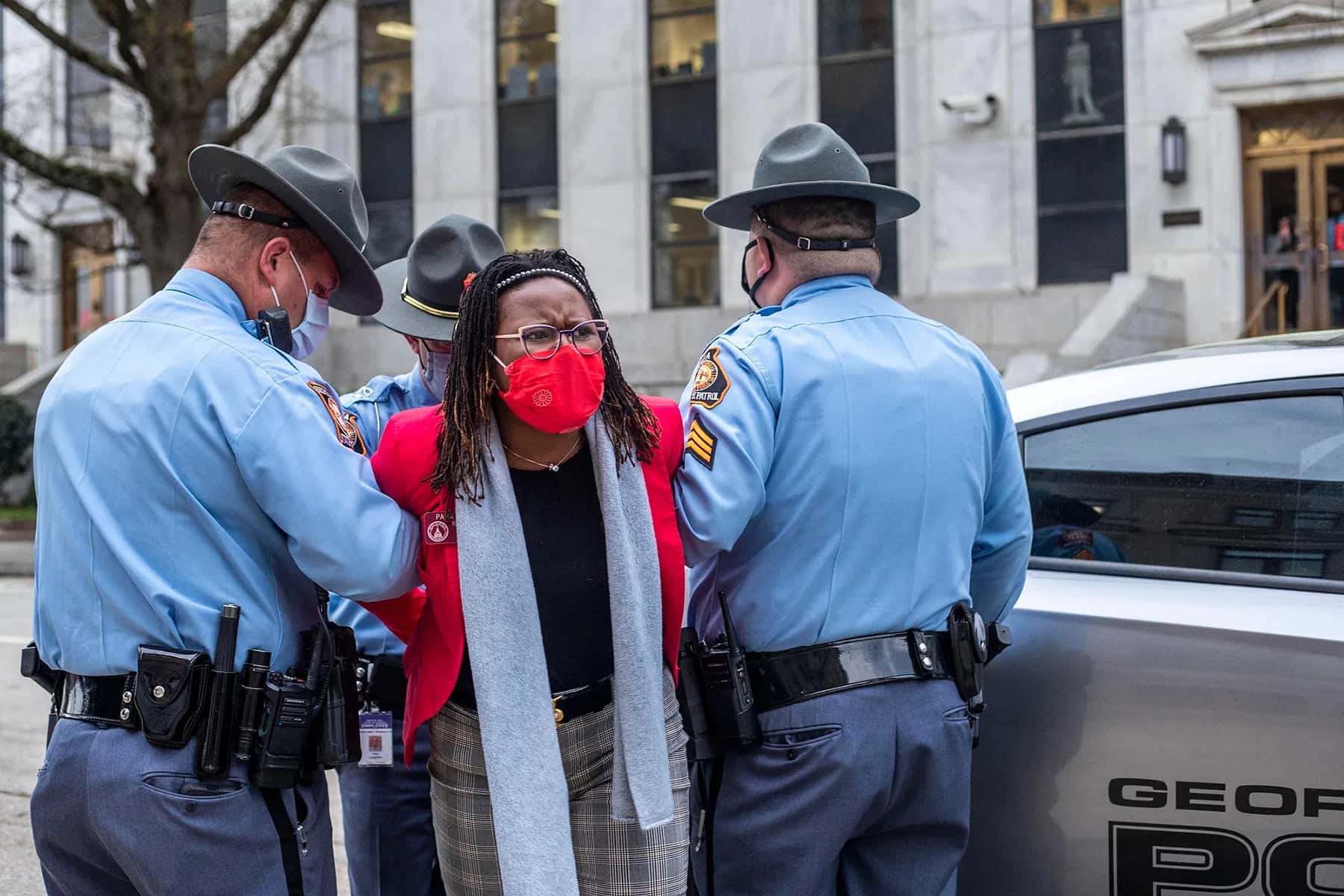
“Do you know I’ve never voted in my life, never been able to exercise my right as a citizen because of the poll tax? … I can’t pay a poll tax, can’t have a voice in my own government.” – Mr. Trout, a Georgia native (1936)
“More than 250 bills to curb or complicate access to polls had been introduced in 43 state legislatures as of February 19, according to the Brennan Center for Justice, which is tracking the bills — and bills have since been introduced in at least two more states, North Carolina and Wisconsin.” – CNN (March 23, 2021)
Since the November 4, 2020 defeat of incumbent President Donald Trump, his supporters across the country have attempted to reverse years of progress on voting rights. Just because the system worked well enough for Joe Biden to win the election, elected officials have lied about nearly non-existent voting fraud for over four consecutive months. If that wasn’t bad enough, there have been systematic attempts to roll back voting rights in nearly every state in the country.
As some are trying their hardest to restrict voting rights, other bills are being written to expand voting rights. The big question is, “What side will win?” The mere introduction of restrictions does not mean it will happen. However, unless Congress acts, in some states it’s a done deal at this point.
CNN reports that “the state legislatures with the highest number of restrictive bills were Georgia, Pennsylvania and Arizona, which all flipped from 2016 to vote for President Joe Biden in 2020.” These Republican run states want to make sure that they flip back to solidly Republican states by the time the 2022 mid-term elections come around.
The restrictions are a cross section of bills related to: automatic voter registration limits; repeal of early voting rights; limiting mail-in ballots; cutting access to ballot drop boxes; severely restricting absentee voting; cancelling voter’s registration if they haven’t voted in a certain number of years; methodically purging voter roles; cutting back on the number of polling places.
They are so clearly biased. There is no real attempt to hide the fact that these new laws are designed to reverse the trends that allowed Biden and other Democrats to win elections in 2020. These laws will impact the small margins Biden won by in multiple states by cutting down on the types of voters that helped him win a very close race in those states.
Why are we fighting the same fight that Dr. King and others seemingly won in the 1960s? It is because laws can always be ignored by lawmakers and courts alike, or simply overturned by new laws, contrary to what we learned in school.
Two constitutional amendments were passed to protect the rights of Black people primarily. Blacks had been the targets of people who insisted that they would not be allowed to have a voice in American politics. As is often the case, the rights Blacks fought for would enhance the rights of all Americans. The 15th Amendment passed in 1870 used language that would be nearly identical to the 24th Amendment to the Constitution passed in 1964.
Fifteenth Amendment: ”The right of citizens of the United States to vote in any primary or other election for President or Vice President for electors for President or Vice President, or for Senator or Representative in Congress, shall not be denied or abridged by the United States or any State by reason of failure to pay any poll tax or other tax.”
Twenty-Fourth Amendment: “The right of citizens of the United States to vote shall not be denied or abridged by the United States or by any state on account of race, color, or previous condition of servitude.
The 1964 Amendment to the Constitution was designed to turn back the multiple state laws that were specifically designed to restrict the voting rights of Black people across the country. Most of these laws were passed in the period known as Jim Crow.
One tool to suppress voting was the creation of poll taxes which often included a grandfather clause that allowed any adult male whose father or grandfather had voted prior to the abolition of slavery to vote without paying this tax. Each of these states required the payment of poll taxes to vote: Alabama, Arkansas, Florida, Georgia, Louisiana, Mississippi, North Carolina, South Carolina, Tennessee, Texas, and Virginia.
Despite the 24th Amendment seemingly outlawing these poll taxes in 1964, four states still required them until stopped by federal judges in 1966 (Texas on February 9, Alabama on March 3, Virginia on March 25, Mississippi on April 8).
Why was the 24th Amendment necessary when the 15th Amendment clearly outlawed the same types of policies and practices? It was necessary because a systematic attack, much like what we are seeing today, was launched to make sure large numbers of Black people would not vote in elections. Other groups have been victimized by these restrictions including some poor whites. Despite this, the clear targets were Black people. Others were simply collateral damage.
As far back as 1876, notwithstanding the 15th Amendment granting Black men the right to vote, the U.S. Supreme Court in U.S. v. Cruks claimed the 15th Amendment did not grant them voting rights stating, “the right of suffrage is not a necessary attribute of national citizenship.” It was the first salvo in the war to disenfranchise Black men after they had finally received voting rights five years after the Civil War ended.
In 1890 the state of Mississippi held a Constitutional Convention with the express aim of disenfranchising Black men. The Mississippi Historical Society tells us that:
“Reconstruction in Mississippi ended in 1875, and many white Mississippians were determined to remove blacks from politics. In the summer of 1890, specially elected delegates to a constitutional convention gathered in Jackson…All but one of the delegates were white…the hottest debates at the convention were literacy tests and poll taxes as requirements for voting. The tests, usually unfair, kept almost all black voters from the polls. The poll tax also kept large numbers of blacks, as well as whites, from voting.”
Alabama followed suit with their own constitutional convention to disenfranchise Black men in 1901. Disenfranchising policies and laws had already been used for years in the state. “Democrats implemented secret ballots that also served as literacy tests because they prevented family members or election officials from reading the ballot for illiterate voters… In addition, the Democrats gerrymandered black votes into single districts, eliminated elected positions in favor of appointments to reduce voters’ influence, and turned to stuffing ballot boxes as a way to ensure political victories”according to the Encyclopedia of Alabama.
“The convention assembled on May 21st and elected… John B. Knox president… In his opening speech, Knox declared to delegates that federally imposed Reconstruction had forced them into action. The convention had been called to disfranchise blacks without disfranchising any whites, which would be achieved by enshrining white supremacy legally in a constitution and eliminating the need for election fraud. Knox further proposed that disfranchising blacks was legitimate if it was done on the basis of their ‘intellectual and moral condition,’ and not because of their race… The most onerous provisions… included requirements for literacy tests (the ability to read and write an article of the U.S. Constitution) and employment for at least one year and installed stringent property qualifications… Section 182 disqualified individuals convicted of a variety of minor crimes, such as vagrancy… delegates provided three exceptions for the latter group… from 1902 to 1903, any adult male who proved that he understood the U.S. Constitution, was a veteran of any nineteenth-century American war, or was descended from a veteran, could register to vote… Stouten H. Dent, William C. Oates, George P. Harrison, and Frank S. White of the suffrage committee believed that the grandfather clause blatantly discriminated against blacks and violated the U.S. Constitution, but they were unable to remove the clause from the suffrage article.”
An amazing book titled, To the colored men of voting age in the southern states: What a colored man should do to vote written in the early 1900’s and published in Philadelphia, made clear how hard it was to vote for Black men. It provided details for multiple states. Here is a synopsis of what it said (All caps in original):
- In Alabama, Louisiana, Mississippi, North Carolina, South Carolina, Virginia and Tennessee: YOU MUST PAY YOUR POLL TAX, YOU MUST REGISTER AND HOLD YOUR CERTIFICATE OF REGISTRATION, If you can read and write you can register.
- In Alabama, Louisiana and South Carolina: If you cannot read and write you can register if you own $300 worth of property.
- In Arkansas and Georgia: YOU MUST PAY YOUR POLL TAX.
- In Florida, Kentucky, Texas and West Virginia: You must reside in the State. A man convicted of almost any crime may be barred from voting.
The author failed to mention that these restrictions could very rarely be overcome, even if you abided by their terms. There were dozens of restrictions listed by the author.
Congress did nothing to abate these clear violations of the 15th Amendment. It was not until 1939 that a discussion of eliminating the poll tax was even had in the halls of Congress. The 24th Amendment was first proposed in 1962 but did not pass until January 23, 1964.
The main reason these practices continued until then is because the U.S. Supreme Court consistently allowed these violations of the 15th Amendment to occur. Back in 1937, the court ruled in Breedlove v. Suttles that the tax was constitutional. They ruled that the payment of a poll tax, “is familiar and reasonable regulated long enforced in many States and for more than a century in Georgia”. They went further by saying, “privilege of voting is not derived from the United States, but is conferred by the state and, save as restrained by the Fifteenth and Nineteenth Amendments and other provisions of the Federal Constitution, the state may condition suffrage as it deems appropriate.”
Another tool used extensively across the South were literacy tests. The late Representative John Lewis wrote this about the test in Alabama.
“…this was a sixty-eight-question survey about obscure aspects of state and federal regulation. Citizens might be asked to recite verbatim long portions of the U.S. Constitution. Some were even asked irrelevant questions such as the number of bubbles in a bar of soap. Black people with Ph.D. and M.A. degrees were routinely told they did not read well enough to pass the test.”
The remedy was supposed to be the 1965 Voting Rights Act. The law made changes to voting laws across the country, including making literacy tests illegal. Prior to passage only about twenty-three percent of voting-age Blacks in the country were registered to vote, but by 1969 the number had jumped to over sixty-one percent.
The Act targeted those areas of the country with long histories of racial discrimination against Blacks in voting. Under Section 5, these jurisdictions could not make any voting rights law changes without preclearance from the Department of Justice. In 1970 and again in 1975, Congress voted to extend Section 5 of the act for five and seven years respectively.
Just as had been done in the past, the protections of voting laws became meaningless again. In 2013 in Shelby County v. Holder, by a 5-4 decision the U.S. Supreme Court ruled that Section 4 (which laid out the formula for determining which states had to seek approval prior to enacting new voting laws) was no longer needed. They claimed that these jurisdictions were no longer discriminating against Black voters. What a joke.
The late Justice Ruth Bader Ginsburg wrote the dissent which Justice Stephen Breyer, Justice Sonia Sotomayor and Justice Elena Kagan each joined in.
“With overwhelming support in both Houses, Congress concluded that, for two prime reasons, (Section) 5 should continue in force, unabated. First, continuance would facilitate completion of the impressive gains thus far made; and second, continuance would guard against backsliding. Those assessments were well within Congress’ province to make… “[V]oting discrimination still exists; no one doubts that”…But the Court today terminates the remedy that proved to be best suited to block that discrimination. The Voting Rights Act of 1965 (VRA) has worked to combat voting discrimination where other remedies had been tried and failed. Particularly effective is the VRA’s requirement of federal preclearance for all changes to voting laws in the regions of the country with the most aggravated records of rank discrimination against minority voting rights.”
Multiple states immediately began writing new laws to restrict voting rights after the ruling came down. America has moved backwards even more since 2013. Lies about a stolen election have poisoned the minds of millions. Far too many people in this country are content to stifle free and fair elections. The people they’ve put into gubernatorial office and state legislatures are the new proponents of Jim Crow. They have been hiding in the weeds, waiting to pounce on what they think is an unsuspecting public. Not all people are naive enough to be blind to their attempts to resurrect one of the ugliest periods of American history. Millions will stand up to this villainy.
Michael Waldman of the Brennan Center for Justice testified before the Senate Committee on Rules & Administration. His words speak to what we need to do by demanding the passage of Senate Bill 1, The For the People Act.
“The For the People Act (S. 1) would be the most significant democracy reform measure in over half a century. It is the next great civil rights bill…It is long overdue and it is urgently needed now…In the 2020 election, despite the pandemic, despite voter suppression, despite the lies, it was the highest voter turnout since 1900. The Trump administration’s own Department of Homeland Security confirmed it was the “most secure election ever.” This is something we ought to celebrate. Instead, what has happened? We had the Big Lie about the election being stolen. We had the insurrection driven by that Big Lie. And now, in states across the country, we see a wave of legislative attempts to curb the vote, the most significant attempted cutback of voting rights since the Jim Crow era…It would stop the new wave of voter suppression, cold. It stops it in its tracks, and Congress has the power, the right, the authority — constitutionally and legally — to do this. This bill would set national standards to ensure that all eligible citizens have the freedom to vote and the ability to make that ballot count. It would make automatic voter registration — already the law in 19 states, Republican and Democratic — the law of the land. It would ensure access to vote by mail and early voting, as well as other measures that have proven popular and effective in recent years and used enthusiastically by tens of millions of people. It would restore the right to vote for returning citizens after they have been incarcerated, so they can rejoin society. Every one of these policies has worked at the national, state, or local level.”
© Photo
Аlyssа Pоіntеr

